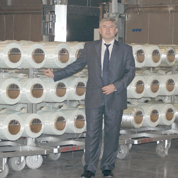Production of strategically vital glass fiber in Tatarstan

It took only two years for Russia’s oil major Tatneft and the Saxony-based German firm Preiss-Daimler Group to build P-D Tatneft-Alabuga Glass Fiber Factory on a green field in the Alabuga special economic zone (SEZ) in Tatarstan. The factory, furnished with the latest state-of-art equipment, manufactured its first fiber glass products in 2010.
In recent times, new alternative materials are gaining more and more popularity in several economic sectors. One of these is glass fiber, which can be viewed as a strategic product that is notable for its multipurpose applications. The importance of glass fiber stems from the fact that composite materials made from it have unique features and advantages compared with traditional industrial materials, such as steel, aluminum, cast iron, concrete, wood, etc. This is because materials made from glass fibers are notable for their higher corrosion resistance, high specific mechanical performance parameters, low thermal conductivity coefficients, smaller masses, longer durability and several other positive characteristics.
The Tatarstan-German joint venture in Yelabuga is focused, first and foremost, on the production of import substitution materials based on internally manufactured glass fiber, thus creating a high-quality source of new raw materials for the automobile, ship- and aircraft building, electro-technical, petrochemical, oil-producing and real-estate construction industries. To construct such innovative factory, P-D Glasseiden GmbH Oschatz, the German partner, provided its technical expertise on manufacturing technologies that meet the highest global standards. This fact guarantees the factory’s high output quality, thus making it competitive, both locally and internationally.
Besides, during the engineering design of the plant, a huge emphasis was placed on achieving high energy efficiency in all the production processes. For example, the glass-melting unit helps reduce energy consumption on production glass mass from 12,000kcal to 1,600kcal, an improvement that has no parallel not only in Russia, but also in Europe. Currently, the factory produces both straight and assembled roving, glass fiber mats and glass fiber mesh. Straight roving is used as a strengthening agent for the production of other materials from glass-fiber plastic by spinning and pultrusion. It is also used for the production of reinforced glass plastic containers for industrial and agricultural uses, reinforced glass-plastic pipes and several other glass-fiber based materials for sports and leisure.
“Composite materials made from glass fibers are notable for their higher corrosion resistance, low thermal conductivity coefficients, smaller masses, longer durability and several other positive characteristics.”
Today, the company plans to launch the production of complex and roving fabrics as well as chopped glass fibers. This will enable it to expand the assortments and nomenclatures of its product outputs and develop new market outlets for them. For instance, chopped glass fiber is used for the production of nonwoven fabrics, which are raw materials for manufacturing linoleum and roofing materials. Roving fabric is used in different industries, notably, in the shipbuilding and auto industries as well as in the production of reinforced glass-plastic materials.
“The annual output capacity of the P-D Tatneft-Alabuga Glass Fiber Factory is 21,000 tons of high-quality products of glass fibers and their byproducts,” factory’s Director Ilvir Sattarov said. “And today, the joint venture is approaching its projected output capacity. The innovative technique applied at the plant makes it possible to obtain high-quality products that are competitive with foreign analogs,” he added. “The company plans to capture about 20% of the Russian market, and thus acquire leading positions in this industry amongst Russian glass fiber manufacturers. Also, the company plans to export over 40% of its annual aggregate output to other European countries.”
Then comes the ultimate question, and that is why was Yelabuga chosen as the site for the factory’s construction in Russia? The answer comes from the fact that Tatarstan, where the Alabuga SEZ is situated, is one of the most economically developed and safest industrial hubs for foreign investors in Russia. Besides, Tatarstan is one of the five best Russian regions, in terms of the most conducive investment climate, and finally, the republic’s economic structure is based mainly on engineering, oil, petrochemical, electro-technical, aircraft and auto industries, which are fully dependent on glass fiber products.
Since 2006, when the Alabuga SEZ was established, both the federal and regional authorities have invested over $320mln in the zone. As a result, Alabuga SEZ now has a number of competitive advantages, making it one of the most attractive industrial hubs in Russia, in terms of attracted investments. Among the zone’s key benefits for investors are favorable tax and customs preferences, highly developed industrial and business infrastructure, valuable strategic location and developed social infrastructure as well as strong regional and government support.












 Web design,
Web design,